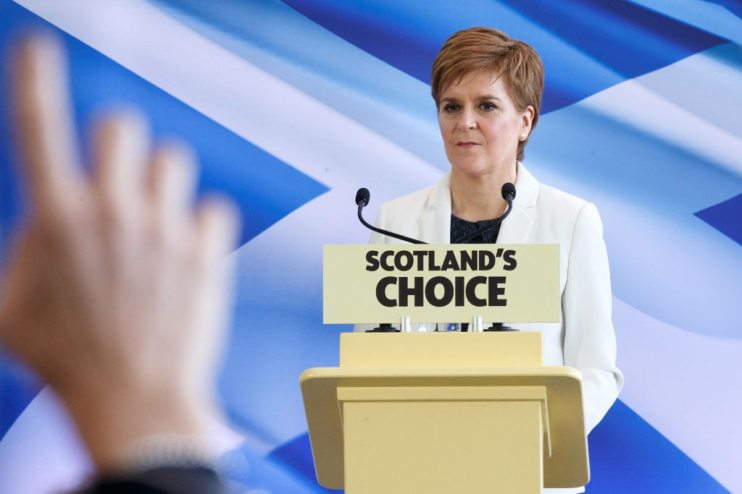Nicola Sturgeon is playing the long game for Scottish independence in a toxic deal with the Greens

Nicola Sturgeon entering her SNP government into a formal cooperation agreement with the Scottish Greens is all about optics and momentum, and not about substance.
In the May election, the SNP narrowly failed to win an overall majority of seats at the Holyrood election. This doesn’t mean they needed a co-operation agreement to govern; the SNP governed as a minority in the last parliamentary session with the Greens choosing to back every budget and to vote against every motion of no confidence, albeit on a case-by-case basis, rather than because of any formal pact.
The new co-operation agreement (only one notch down from a full coalition) offers the SNP a degree more stability, but that is all. So why have they done it, and what consequences will follow?
There are three main reasons. The first is that the SNP as both a party and as a government loathe criticism. Sturgeon runs the tightest ship in British politics, micro-managing her ministers and controlling her party from top to bottom. She dislikes her authority being challenged and she hated the way the opposition parties were able to operate in the last parliamentary session to force concessions from the Nationalists. Whether it was in the passage of legislation or in the winning of key votes, Sturgeon and her Cabinet had to do far more ducking and diving than they found comfortable. For them, the deal with the Greens means they will not have to endure any more such inconvenience for the next five years. Opposition MSPs may as well go home.
Even if the SNP remains on Sturgeon’s short leash, the broader independence movement is increasingly fractious. Alex Salmond now offers an alternative for those ever more impatient for independence—or, at least, for another independence referendum—in the form of his new Alba party. But the medley of socialists, environmentalists, communists, extremists, idealists and dreamers who spend their days agitating amongst themselves and online in their cyber-bubbles for independence are growing impatient with what they perceive to be Sturgeon’s high heels digging in and slowing the project down.
The SNP leadership are not in a rush. It was Theresa May who said as Prime Minister that now is not the time for a second independence referendum. Nicola Sturgeon seems to have adopted that as unofficial SNP policy.
The Scottish Greens are certainly extremists. Rather than being bothered about the actual environment, they occupy their days arguing against economic growth and taking up a radical gauntlet on trans rights. They are all too ready to castigate dissenters as transphobics who are fuelled by hate. Sturgeon is a cautious, normally relatively prudent social democrat of the centre-left. That she should go out of her way to seek the formal co-operation of anti-growth leftist hardliners such as the Scottish Greens tells you how hard she thinks she needs to work to keep the fractious pro-indy movement together. The deal buys her credibility—and therefore time—with the impatient Yes movement.
Afterall, it is of course all about independence (with the SNP, it always is). Scotland now has a government with a formal majority of MSPs in Holyrood committed to separating Scotland from the rest of the UK and to putting the independence question back to the people of Scotland in a repeat referendum before the next Holyrood elections.
Conventional wisdom is that this cannot lawfully happen without the consent of the UK Government, consent which will be withheld. Portraying the Tories as those evil English imperialists who deny the Scots their voice has been Sturgeon’s preferred play ever since Boris Johnson became Prime Minister. It’s all designed to win a few more undecideds over into the Yes column. And that, in the end, is the only thing Nicola Sturgeon cares about. That is why she’s pulling the Greens into her Government. The alliance has almost nothing to do with the natural environment and everything to do with the hostile environment with the Tories Sturgeon is cultivating in the hopes of advancing the cause of Scottish independence.